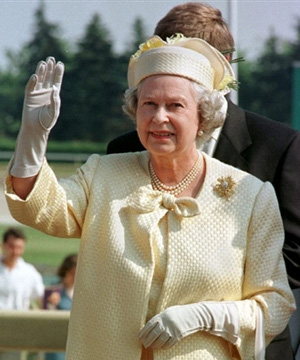 |
|
Queen Elizabeth II's English has become less 'upper-class' sounding since her 1952 accession to the throne. Image: AFP |
LONDON: Queen Elizabeth II's famous cut-glass accent is now sounding less upper-class, said researchers who analysed her famous Christmas broadcasts.
German researchers used digital technology to analyse each of her messages to the Commonwealth since her 1952 accession to the throne.
They tracked the subtle evolution in her speech from the aristocratic so-called 'Upper Received Pronunciation' to the less plummy 'Standard Received Pronunciation' - a close relative of the decidedly common 'Standard Southern British English'.
Phoneticians have documented changes in pronunciation and dialect in society over 60 years using sound recordings. But author Jonathan Harrington, professor of phonetics and digital speech processing at the University of Munich, wanted to see whether those same changes over time could be registered using one person.
The Christmas messages are high-quality recordings, delivered by the same person in the same format and tone over 53 years - making Queen Elizabeth's accent perfect to analyse, he said.
"As far as I know, there just is nobody else for whom there is this sort of broadcast archive," said Harrington, whose results are reported in the Journal of Phonetics.
He said the aristocratic way of pronouncing vowels had gradually ceased to be a class apart over the decades - something noticeable in the Queen's speech.
"Her accent sounds slightly less aristocratic than it did 50 years ago. But these are very, very subtle and slow changes that we don't notice from year to year," he explained.
"In 1952 she would have been heard referring to 'thet men in the bleck het'. Now it would be 'that man in the black hat'.
"Similarly, she would have spoken of 'the citay' and 'dutay', rather than 'citee' and 'dutee', and 'hame' rather than home. In the 1950s she would have been 'lorst', but by the 1970s 'lost'.
"There are not many people who speak like that now. We now produce this vowel with a slightly lower jaw and more open mouth. This is one of the changes in which the queen has participated too."
Once digitised, the sovereign's voice was put through a spectral analysis. "You can find out about vowel resonances, which are most closely linked to the way in which vowels sound. It's very painstaking work," said Harrington, who spent six years studying the broadcasts.
The changes in her speech were not a conscious attempt to come closer to her subjects, believed Harrington. Rather, social power shifts during the lifetime of the 80-year-old monarch may be responsible.
"We may well be able to relate these sorts of accent changes to changes in the class structure which have taken place in the last 50 years in Britain," Harrington said.
"Certainly 40 or 50 years ago, Britain was a more socially stratified society. Then there was the giant social revolution in the 1960s. Now we find that there aren't the same divisions between social classes."
He added: "We want to try and work out what the mechanisms are for sound change and also, for example, how dialects differ. How did the American accent become different? With just text and without sound recordings, its difficult to say."
He hopes that resulting future work, when more sound recording archives such as that of Queen Elizabeth become available, should be able to track the evolution of accents over the years to come.





